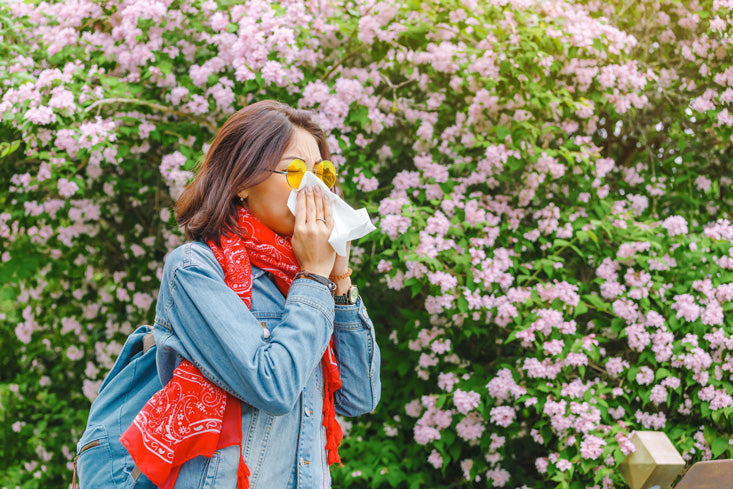By Susan Smith Jones, PhD
Health comes from the farm, not the pharmacy, as my grandmother, Fritzie, used to tell me. The closer we live to nature, and take advantage of her treasure-trove of natural remedies, the easier it will be to heal the body and maintain wellness.
This is the time of year when lots of people experience a cold or the flu, or other illnesses so prevalent these days or have even more concerns about Covid-19 and the variants. In this article, I will focus on some of my favorite natural remedies to keep your immune system functioning efficiently so that your body can heal itself and keep you in the pink. I will suggest some herbs and a vitamin to help support and strengthen the immune system and to help you deal with colds, flu and allergies. In my books Wired for High-Level Wellness and The Curative Kitchen & Lifestyle, you will find many more natural remedies for the entire family for whatever ails you.
The immune system is our first line of defense in maintaining optimum health. It is a complex system of physiologic barriers such as the skin and mucosal membranes and associated immune cells. Its job is to identify and destroy invading pathogens, including viruses and bacteria. The immune system also inhibits toxins that can damage cells, including environmental pollutants and free radicals. Additionally, it can recognize rogue cells that have become malignant and eliminate them before a serious condition occurs.
When the immune system is weakened, such as by stress, inadequate sleep, poor diet, or intake of drugs and alcohol, the body is more susceptible to colds, flu, and other infections. A depressed immune system may play a role in the development of cancer, as abnormal cell growth goes unchecked. Years of chronic low-level inflammation, an indicator of an out-of-balance immune system, can contribute to diseases such as cardiovascular disease. On the other hand, an overactive immune system can also cause problems; in autoimmune diseases such as rheumatoid arthritis and lupus, the body mistakes healthy tissues for toxic agents. Allergic reactions, too, occur when the immune system overreacts to a normally harmless invader such as dust.
SIDEBAR: Immune Depressors
The following are known to depress the immune system1:
- Stress
- Inadequate sleep
- Sugar intake
- Exposure to allergens (food and environmental)
- Toxic buildup (not enough cleansing through bowels, lungs, and kidneys)
- Trans fats intake
- Coffee intake (too much in a day)
- Tobacco smoking
Various herbs can provide both direct and indirect support to the immune system. Some herbs may stimulate the production of immune cells -- including white blood cells, macrophages, and phagocytes -- which fight viral and bacterial invaders. Other herbs may provide support to major organs like the liver and kidneys, which eliminate toxins from the body. The following are herbs commonly used to strengthen the immune system.
Astragalus
Astragalus root, also known as "huang qi" or milk vetch root, has been used in traditional Chinese and East Indian medicine for thousands of years to strengthen and rejuvenate the body. Ongoing research has demonstrated both its immune-stimulating and anti-cancer properties. Astragalus appears to fortify the immune system by increasing the number of immune cells in the body. It stimulates the infection-fighting activity of macrophages and the production of interferon, a cellular protein that fights off invading organisms. As a result, it can boost your immunity against colds and flu as well as bacterial and fungal infections. Cancer patients may find particular benefits; studies suggest that the root can stimulate the immune systems of individuals with cancer, inhibit the growth of tumors, and lessen the side effects of chemotherapy and radiation.3,4
Echinacea
Also known as purple coneflower, echinacea was used by Native Americans for centuries. Studies show that when taken at the first sign of viral illness, echinacea can reduce the length and severity of infections including colds and flu.5 Like astragalus, it appears to work by increasing the number of immune cells in the body and stimulating production of interferon. It may also stimulate phagocytosis, a function of the immune system in which immune cells engulf and destroy invaders such as viruses and bacteria.6 At the same time, echinacea can inhibit production of a bacterial enzyme called hyaluronidase, which spreads infecting bacteria throughout the body.
Garlic
The pungent bulb used to flavor a wide variety of dishes the world over is also a powerful infection fighter. It has antimicrobial properties, making it a potent defender against typhoid, dysentery, and streptococcus bacteria, as well as an antidote to colds and flu. Ajoene, an organosulfur compound found in garlic, has been shown to shrink the tumors of skin cancer patients.7
Oregano Oil
This high potency purifier provides excellent support for the immune system. Oil of Oregano is extracted from wild oregano plants, and two key compounds it possesses are carvacrol and thymol. Studies have shown that both of these compounds have significant effect on harmful microorganisms that cause illness. It is recognized to be a potent antiviral and bacterial, antifungal, and antiparasitic oil that can reduce pain and inflammation and effective fight off infections.
Pau d’Arco Bark
Pau d’Arco is a natural herb from the inner bark of the Tabebuia Avelanedae or Tabebuia Impetiginosa, also known as taheebo or ipe roxo. This South American tonic is a source of over 20 beneficial phytocompounds, including many immune supporting nutrients. It is used worldwide as a supportive herb in cancer treatment programs to help lessen the side effects of chemotherapy and to fortify overall immune defenses. Pau d’Arco is currently being researched for its possible anti-tumor properties.
Milk Thistle Seed
Milk thistle is a natural liver protectant and antioxidant that supports the immune system. Silymarin, a component of milk thistle, helps protect the liver from the effects of alcohol and other toxins found in food. It also promotes enzyme production to break down and eliminate these toxins.
Vitamin C
The body's immune and detoxification systems make special use of vitamin C. It is important in the function of a variety of mechanisms to help protect the body from infection, including the manufacture of white blood cells, complement proteins, and interferons. When the body is exposed to toxins, vitamin C is often required for the body to begin processing the toxins for elimination. Weak immune function, including susceptibility to colds and other infections, can also be a telltale sign of vitamin C deficiency. Since the lining of our respiratory tract is heavily dependent on vitamin C for protection, respiratory infection and other lung-related conditions can also be symptomatic of vitamin C deficiency.8
Colds, Flu & Allergies
Fortifying one's immune system is the best defense against colds, flu, and allergies. An immune system weakened by stress, fatigue, air pollution, and other toxins is more vulnerable to respiratory infections (including Covid-19 and the variants) and allergies. However, when such irritations do strike, certain herbs can go a long way toward relieving the symptoms.
The Common Cold
The common cold, as its name suggests, is the most common of all human diseases. It affects adults an average of 2-4 times per year and school-aged children as many as 12 times per year. A cold is a viral infection of the upper respiratory system resulting in sneezing, sniffling, congestion, runny nose, sore throat, coughing, headache, and fatigue. Most colds are caused by exposure to one of approximately 200 strains of a virus (usually the rhinovirus) followed by an incubation period of 1-3 days. Up to 50% of people exposed to a cold virus will become infected, and approximately 75% of those will experience symptoms.
Unfortunately, there is no cure for the common cold. Even though antibiotics have no effect on viral illnesses, approximately one in three cold patients erroneously receive prescriptions for antibiotics. These treatments are not only unnecessary, but can also lead the body to develop a resistance to them from improper use. Drinking plenty of fluids, getting proper rest, and soothing symptoms with the herbs discussed below are the best ways to find comfort and hasten healing.
SIDEBAR: Tips to Avoid Getting a Cold (source: FDA)9
- Wash your hands often. You can pick up cold germs easily, even when shaking someone's hand or touching doorknobs or handrails.
- Avoid people with colds when possible.
- Sneeze or cough into a tissue and then throw the tissue away.
- Clean surfaces you touch with a germ-killing disinfectant.
- Don't touch your nose, eyes, or mouth. Germs can enter your body easily by these paths.
The Flu (Influenza)
While symptoms of the common cold may be uncomfortable, flu symptoms are much more severe. Signs of the flu include sudden onset with a headache, dry cough, and chills with muscle aches in the backs and the legs. Fever of up to 104 degrees Fahrenheit is common. The fever typically begins to subside on the second or third day, and then respiratory symptoms such as nasal congestion and sore throat appear. Fatigue and weakness may continue for days or even weeks. According to the FDA, flu typically affects 20-50% of the U.S. population each winter.10 It is highly contagious, spreading through direct person-to-person contact. Like colds, the flu is a viral infection, rendering antibiotics useless as a treatment. Bed rest, adequate fluids, and soothing herbs are the best ways to help your body fight the virus.
Allergies
The most common of allergies, hay fever -- which affects 20% of Americans -- produces symptoms quite similar to those experienced by cold and flu sufferers. The congestion, sneezing, and coughing of hay fever is caused by histamine, which is released when the immune system overreacts to pollen. Other irritants including dust, animal dander, and food products can induce similar symptoms. Though conventional allergy drugs (antihistamines) effectively relieve these symptoms, they have a strong drying effect that can do damage to delicate tissues and mucous membranes. Additionally, such drugs may have undesirable side effects including drowsiness and heart palpitations. Many of the same herbs that relieve cold and flu symptoms also quell the discomfort of allergies, soothing irritated membranes and enhancing the body's overall immunity to allergies.
Ginger Root
Ginger's long list of therapeutic applications has been recorded in early Sanskrit and Chinese texts as well as ancient Greek, Roman, and Arabic medical literature. The warming sensation of ginger is a boon for staving off colds and flu. Ginger induces healthy sweating, which reduces fevers and detoxifies the body. It is also soothing for respiratory ailments.
Horehound
Horehound's historical use for respiratory health dates back to the time of ancient Egypt. It has been used for thousands of years in old-fashioned herbal preparations to soothe the throat and respiratory system, as well as to support healthy breathing. Currently, it remains an important ingredient either by itself or in combination with other herbs to promote healthy lung and bronchial function.
Boneset
Boneset was traditionally used by Native Americans and early settlers to support the body's natural defenses and treat colds, fevers, and body aches. Today, many continue to value it for immune system support and upper respiratory function. It is considered to be an effective fever breaker and an analgesic for flu-associated joint and muscle pain. It is also thought to maintain white blood cell function, a crucial part of the body's defense mechanism.
Rosemary
This kitchen spice that imparts an intense, woodsy flavor to foods also soothes flu symptoms. It is thought to stimulate the adrenal glands and is helpful for those recovering from chronic illness. Applied as a lotion or added to bath water as an oil, it's excellent for relieving stiffness as well as muscular aches and pains.
Goldenseal
This herb was widely used by Native Americans, who discovered its ability to dry up nasal and chest congestion. Its natural alkaloids are responsible for its effect on overactive mucous membranes and its support of immune system function by increasing white blood cell activity. Goldenseal has proven antibacterial properties, making it effective for bacterial ear, throat, and sinus infections.
Myrrh Gum
Myrrh has been prized in many cultures for well over 3,000 years. It is an invaluable aid for immune system support and provides a soothing, powerful effect on the mucous membranes of the sinuses, throat and respiratory tract. Myrrh gum is a primary ingredient in many traditional Middle Eastern, Chinese, and Tibetan formulas, as well as in countless natural oral health products and skincare salves. It’s especially effective when mixed together with goldenseal root.
Mullein Leaves
The soft, velvety leaves of the mullein plant provide soothing support to the entire respiratory system. Mullein has demulcent properties, so it coats and protects both the throat and respiratory passages. This natural action helps promote free breathing and clears mucus. Mullein has a long history of use as a medicine, and has often been utilized in the treatment of asthma and other respiratory disorders.
In reaching for the remedies from the farm, not the pharmacy, we reconnect with our natural environment and with the traditions of our ancestors. Fortunately, we have a growing body of scientific literature revealing that much of the wisdom of the ancients was scientifically sound; specific herbs can indeed have a positive impact on essential physiological functions and help protect us from disease.
Susan Smith Jones, PhD:
For more information on Susan, her work, and her latest faith-based books (Wired for High-Level Wellness, Invest in Yourself with Exercise, Kitchen Gardening, and Be the Change) please visit: www.SusanSmithJones.com. Sign up for Susan’s free, monthly Healthy Living Newsletters that are exclusive for subscribers and contain a wealth of holistic health and lifestyle info and delicious plant-based recipes.
References
1 - Washington, Laura, N.D. Herbal Medicine for Health and Well-Being. New York: Sterling Publishing Co, 2003. p. 63.
2 - Yoshia Y, Wang MQ, et al. Immunomodulating activity of Chinese medicinal herbs and Oldenlandia diffusa in particular. Int J Immunopharmacol 1997; 19:359-370.
3 - Lau, GB, Ruckle HC, et al. Chinese medicinal herbs inhibit growth of murine renal cell carcinoma. Cancer Biother 1994;9:153-161.
4 - Cha RJ, Seng DW, Chang QS. Non-surgical treatment of small cell lung cancer with chemo-radio-immunotherapy and traditional Chinese medicine. Chung Hua Nei Ko Tsa Chih 1994;33:462-466.
5 - Brinkeborn RM, Shah DV, Dgenring FH. Echinaforce and other Echinacea fresh plant preparations in the treatment of the common cold. A randomized, placebo-controlled, double-blind clinical trial. Phytomedicine 199;6:1-5.
6 - Burger RA, Torres AR, et al. Echinacea-induced cytokine production by human macrophages. Int J Immunopharmacol 1997;19:371-379.
7 - Tilli CM, Stavast-Kooy AJ, Vuerstaek JD, Thissen MR, Krekels GA, Ramaekers FC, Neumann HA. The garlic-derived organosulfur component ajoene decreases basal cell carcinoma tumor size by inducing apoptosis. Arch Dermatol Res. Jul;295(3):117-23. 2003.
8 - Carr AC, Frei B. Toward a new recommended dietary allowance for vitamin C based on antioxidant and health effects in humans. Am J Clin Nutr 1999;69(6):1086-1107 1999.
9 - U.S. Food and Drug Administration. “What to Do for Colds and Flu.” http://www.fda.gov/opacom/lowlit/clds&flu.html
10 - Nordenber, Tamar. Colds and Flu: Time Only Sure Cure. U.S. Food and Drug Administration. http://www.fda.gov/fdac/features/896_flu.html






